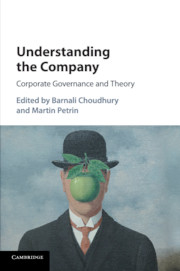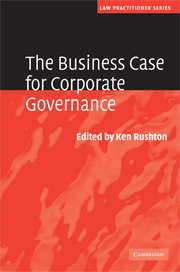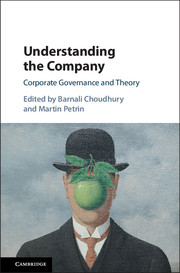Corporate Duties to the Public
£111.00
- Authors:
- Barnali Choudhury, University College London
- Martin Petrin, University College London
- Date Published: January 2019
- availability: Available
- format: Hardback
- isbn: 9781108421461
£
111.00
Hardback
Other available formats:
eBook
Looking for an inspection copy?
This title is not currently available on inspection
-
In a world where the grocery store may be more powerful than the government and corporations are the governors rather than the governed, the notion of corporations being only private actors is slowly evaporating. Gone is the view that corporations can focus exclusively on maximizing shareholder wealth. Instead, the idea that corporations owe duties to the public is capturing the attention of not only citizens and legislators, but corporations themselves. This book explores the deepening connections between corporations and the public. It explores timely - and often controversial - public issues with which corporations must grapple including the corporate purpose, civil and criminal liability, taxation, human rights, the environment and corruption. Offering readers an encompassing, balanced, and systematic understanding of the most pertinent duties corporations should bear, how they work, whether they are justified, and how they should be designed in the future, this book clarifies corporations' roles vis-à-vis the public.
Read more- Provides an in-depth look at instances that imply corporate duties to the public and examines a range of pertinent corporate duties issues
- Investigates the theory and practice of corporate responsibilities toward third parties and looks at how they work, whether they are justified, and how they should be designed in the future
- Explores the role of corporations beyond traditional corporate social responsibility (CSR) to examine the idea of corporate responsibilities more broadly and with reference to a range of theoretical viewpoints
Reviews & endorsements
'This book is a massive achievement. It is both broad and deep, offering a balanced and comprehensive look at the multitude of ways corporations interact with the public and the policy options available to address those interactions. Anyone thinking about the role of business in global society should have this impressive volume at their fingertips.' Kent Greenfield, Boston College Law School
See more reviews'This book finds its niche among other works about corporate law, human rights, and corporate social responsibility.' D. Truty, Choice
Customer reviews
Not yet reviewed
Be the first to review
Review was not posted due to profanity
×Product details
- Date Published: January 2019
- format: Hardback
- isbn: 9781108421461
- length: 386 pages
- dimensions: 235 x 157 x 24 mm
- weight: 0.67kg
- availability: Available
Table of Contents
Acknowledgements
1. Introduction
1.1 Common arguments for a closer relationship between corporations and the public
1.2 The structure of the book
2. Background
2.1 A brief history of the corporation and its relationship with the public
2.2 Justifying corporate duties
2.3 Conclusion
3. Corporate purpose
3.1 Theoretical approaches
3.2 The corporate purpose in UK and US law
3.3 The diverging views assessed
3.4 A recalibrated purpose
3.5 Conclusion
4. Corporate governance
4.1 Introduction
4.2 Corporate governance policies
4.3 Conclusion
5. Parent company liability
5.1 Introduction
5.2 The group company and limited liability
5.3 Circumventing limited liability
5.4 The (economic) case for group company liability
5.5 Reforming liability for group companies
5.6 Two-tiered liability based on risk internalization
5.7 Conclusion
6. Tort law
6.1 Justification for corporate liability
6.2 Corporate theories
6.3 Attribution mechanisms
6.4 Alternative approaches - depersonalized corporate liability
6.5 Conclusion
7. Criminal law
7.1 Recognition of corporate criminal liability
7.2 Attribution mechanisms
7.3 Justifying and designing corporate criminal liability
7.4 Conclusion
8. Human rights law
8.1 The legal regime for corporations and human rights
8.2 Defining corporate duties vis-à-vis human rights
8.3 Conclusion
9. Environmental law
9.1 The case for corporate environmental responsibility
9.2 Existing mechanisms defining corporate environmental responsibility
9.3 Conclusion
10. Corruption
10.1 Defining corruption
10.2 Why combat corruption?
10.3 Anti-corruption rules
10.4 Corporate duties for combating corruption
10.5 Conclusion
11. Tax law
11.1 Why are corporations taxed?
11.2 The problem of aggressive tax planning
11.3 Contextualizing the role of governments
11.4 The corporate duty (not) to engage in tax avoidance)
11.5 Conclusion
12. Conclusion
12.1 Key findings
12.2 Common themes and lessons
12.3 Final thoughts
Index.
Sorry, this resource is locked
Please register or sign in to request access. If you are having problems accessing these resources please email [email protected]
Register Sign in» Proceed
You are now leaving the Cambridge University Press website. Your eBook purchase and download will be completed by our partner www.ebooks.com. Please see the permission section of the www.ebooks.com catalogue page for details of the print & copy limits on our eBooks.
Continue ×Are you sure you want to delete your account?
This cannot be undone.
Thank you for your feedback which will help us improve our service.
If you requested a response, we will make sure to get back to you shortly.
×




